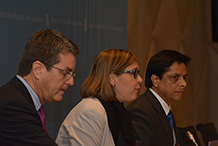MORE:
The EIF Steering Committee, which includes representatives of all least-developed countries (LDCs) and the donor community as well as EIF partner agencies, decided to extend the mandate of the programme into a second phase, starting from 2016. The Steering Committee urged the EIF to build on the achievements of the first phase while addressing the need for reforms in key areas in order to improve the efficiency, effectiveness and sustainability of the programme.
The EIF is currently helping 50 of the poorest countries worldwide. The WTO is one of six partner agencies of the programme and also hosts the Executive Secretariat.
In his introductory remarks to the EIF Steering Committee, DG Azevêdo stressed that the programme is making a difference on the ground through increased private sector development and employment in some of the poorest countries. “There is no other programme that supports LDCs to address all aspects of their trade capacity in this way – and that puts the LDCs themselves in the driver's seat,” said DG Azevêdo.
Speech by DG Azevêdo
Madam Chair,
Excellencies,
Distinguished Members of the EIF Steering Committee,
Ladies and gentlemen,
Thank you for giving me the opportunity to say a few words before the meeting gets underway.
I would like to start by welcoming Ambassador Yvette Stevens of Sierra Leone to her new role as Chair of the EIF Board. I wish her very well in this important role.
We, as the EIF partnership, are at crossroads. The current phase of the EIF is coming to an end in December 2015. Today's meeting will determine its future.
I think we all believe that trade can be an effective tool for economic growth and poverty reduction, when the right conditions exist. The EIF was established precisely to help LDCs create those conditions.
Indeed, the final evaluation of the EIF recognizes that the EIF programme remains highly relevant in addressing the trade needs of the LDCs.
It refers to examples of how the programme has helped to lay the foundations of solid trade policy frameworks, and institutions that directly support countries' development plans.
And we are starting to see that this is making a difference on the ground, through increased private sector development and employment in some of the poorest countries.
There is no other programme that supports LDCs to address all aspects of their trade capacity in this way – and that puts the LDCs themselves in the driver's seat.
Of course we know as well that there have been some challenges and that there are still varied levels of results in different countries.
The Evaluation highlighted that the objective of additional resource mobilization at the country level has been especially challenging.
It also pointed to governance and efficiency related issues which need to be addressed.
And, in order for the programme to remain relevant, the Evaluation proposed new issues for inclusion, such as regional integration, the role of the private sector and proper insertion into global value chains.
The EIF Board – supported by its Working Group process, of which the WTO Secretariat is a part – has been deliberating over all of these recommendations on the future of the EIF, which will be put before you all for endorsement later today.
When I addressed the meeting of the EIF Board in October, I shared with you my view that the EIF must continue into a second phase.
I therefore urge you all to consider, constructively and positively, the recommendations before you today and endorse an extension of the EIF.
This will enable the vital assistance that the EIF provides to be maintained and improved – that's our hope.
And it will send a strong message that we remain committed to helping LDCs to realize their full potential.
In addition, it will pave the way to prepare for a pledging conference to replenish the EIF Trust Fund.
The WTO stands ready to help in any way it can. If so requested, we would be pleased to host the pledging conference here at the WTO during, or back-to-back with, the Fifth Global Review of Aid for Trade – which will be held from 30 June to 2 July next year.
Indeed, I think that the partnership itself plays an important role.
We are all responsible for improving the EIF's effectiveness and making LDCs more active players in the multilateral trading system.
The WTO is proud to provide the institutional home of the EIF – because of what it delivers – and because of what it says about our priorities.
WTO members took a number of decisions in recent weeks which have put our negotiating work back on track. And, as part of those decisions, they committed to redoubling their efforts to deliver Bali, to deliver the Bali outcomes for LDCs and to develop a work program on the remaining DDA issues.
I think this just underlines again that LDCs are at the heart of our work here.
And today we have a real opportunity to contribute to their growth and development prospects by extending the EIF into a new phase.
So let's build on the successes to date, and undertake the necessary reforms to deliver more results, in a more effective, efficient and sustainable way, which demonstrates real value for money.
I look forward to continue working with you in the next phase, which I hope you will approve today.
Thank you for listening. I wish you a successful meeting.
Find out more
> Problems viewing this page?
Please contact [email protected] giving details of the operating system and web browser you are using.

